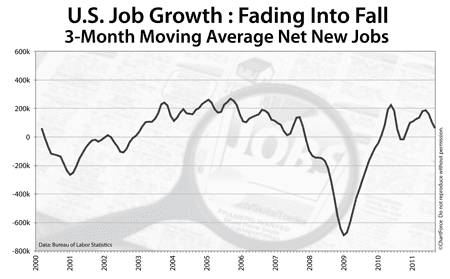 The U.S. economy is no longer adding new jobs. Last Friday, in its monthly Non-Farm Payrolls report, the Bureau of Labor Statistics reported that the U.S. economy added exactly zero new jobs in August as the national Unemployment Rate held steady at 9.1 percent. Despite the "zero" reading, the jobs figures were in the red. This is because the BLS issued revisions to its June and July figures that adjusted the two months of data down by 58,000 jobs. Economists had expected a monthly reading of +75,000. Their estimates missed. The weaker-than-expected jobs data fueled a stock market sell-off that pushed stocks down 2.5% and spurred a bond market rally. Mortgage bonds -- the securities on which mortgage rates in Henrico are based -- improved Friday ahead of Labor Day Weekend, and carried that momentum into Monday. While the U.S. markets were closed, global investors snapped up "safe" assets in fear of a second wave of financial crises. Already this year, markets have grappled with sovereign debt concerns in Greece and Portugal. Now, Italy is facing similar international scrutiny, forcing markets to question the health of the Eurozone. Concerns like these tend to benefit home buyers and mortgage rate shoppers and that's exactly what we're seeing. Mortgage rates are falling this week. Rates may reverse quickly, however. Later this month, the Federal Reserve and White House are each expected to add stimulus to the U.S. economy. If they do, it may push investors back into risky assets including equities at the expense of safe securities. This would spark a bond market sell-off and send rates higher. Possibly by a lot. Therefore, if you're currently looking for home or comparing rates between lenders, consider executing sooner rather than later. Mortgage rates are low today, but low rates may not last. And when rates reverse higher, it will likely happen fast.
The U.S. economy is no longer adding new jobs. Last Friday, in its monthly Non-Farm Payrolls report, the Bureau of Labor Statistics reported that the U.S. economy added exactly zero new jobs in August as the national Unemployment Rate held steady at 9.1 percent. Despite the "zero" reading, the jobs figures were in the red. This is because the BLS issued revisions to its June and July figures that adjusted the two months of data down by 58,000 jobs. Economists had expected a monthly reading of +75,000. Their estimates missed. The weaker-than-expected jobs data fueled a stock market sell-off that pushed stocks down 2.5% and spurred a bond market rally. Mortgage bonds -- the securities on which mortgage rates in Henrico are based -- improved Friday ahead of Labor Day Weekend, and carried that momentum into Monday. While the U.S. markets were closed, global investors snapped up "safe" assets in fear of a second wave of financial crises. Already this year, markets have grappled with sovereign debt concerns in Greece and Portugal. Now, Italy is facing similar international scrutiny, forcing markets to question the health of the Eurozone. Concerns like these tend to benefit home buyers and mortgage rate shoppers and that's exactly what we're seeing. Mortgage rates are falling this week. Rates may reverse quickly, however. Later this month, the Federal Reserve and White House are each expected to add stimulus to the U.S. economy. If they do, it may push investors back into risky assets including equities at the expense of safe securities. This would spark a bond market sell-off and send rates higher. Possibly by a lot. Therefore, if you're currently looking for home or comparing rates between lenders, consider executing sooner rather than later. Mortgage rates are low today, but low rates may not last. And when rates reverse higher, it will likely happen fast.